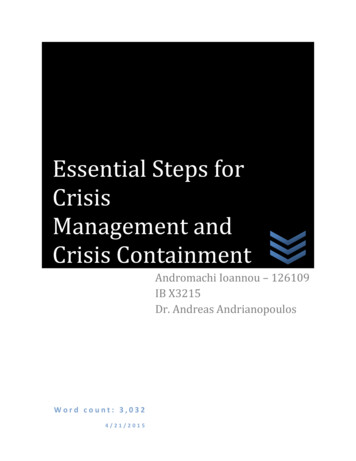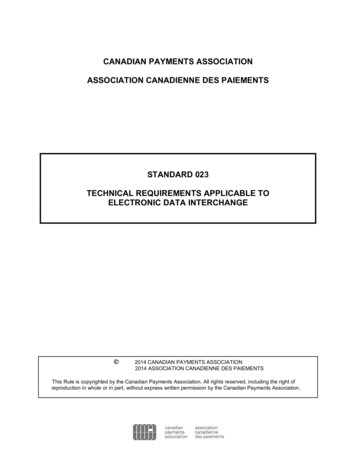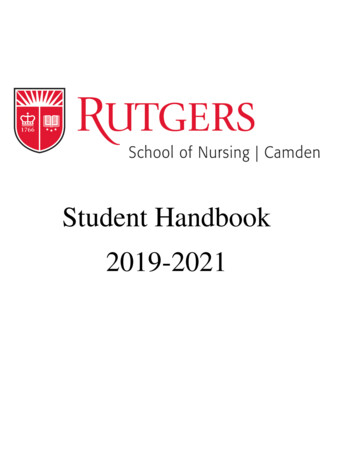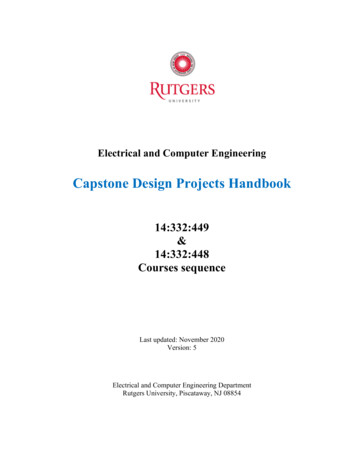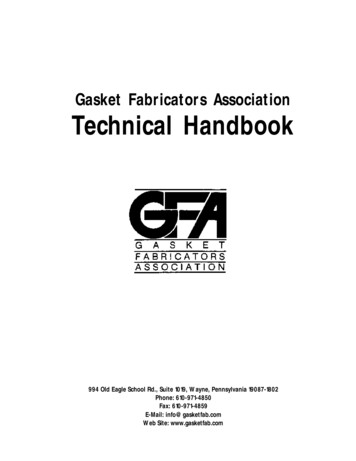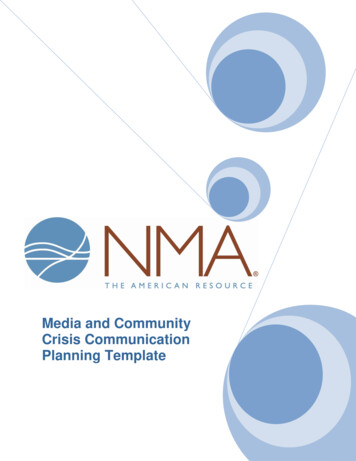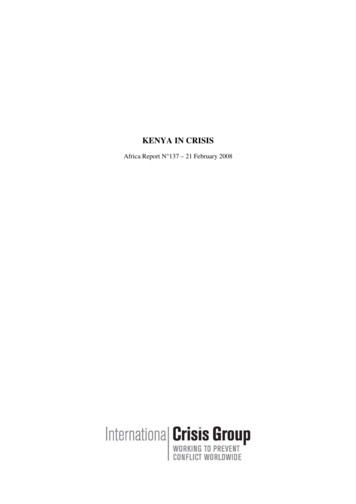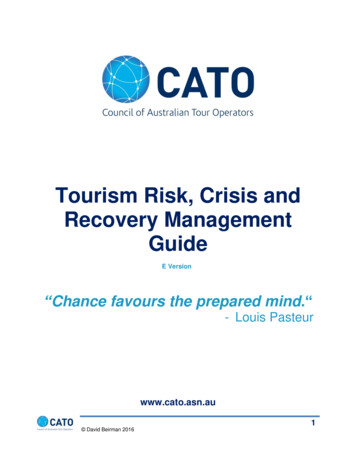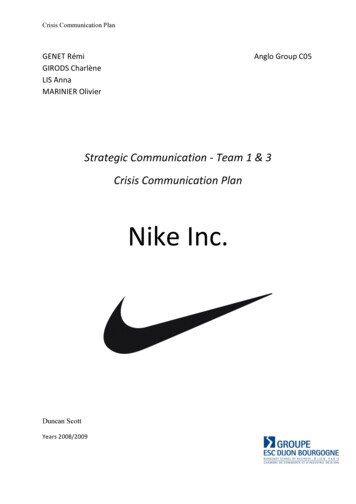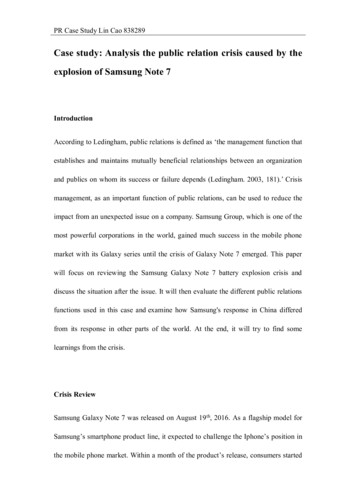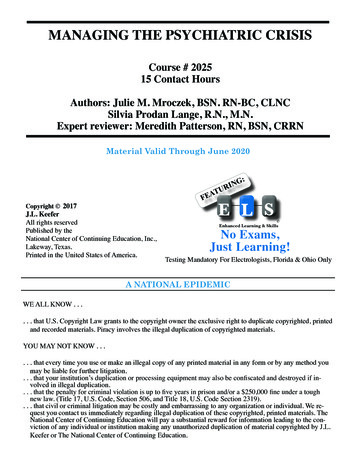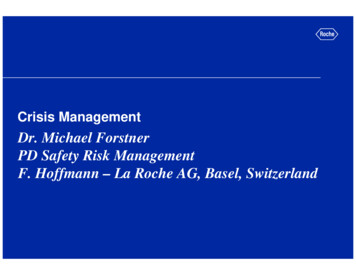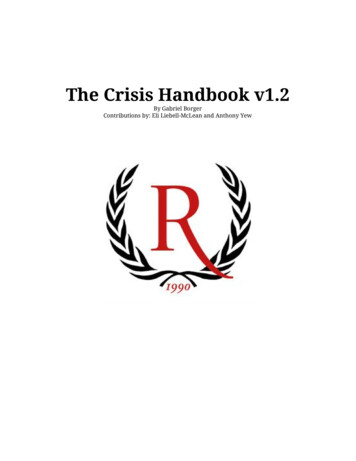
Transcription
The Crisis Handbook v1.2By Gabriel BorgerContributions by: Eli Liebell-McLean and Anthony Yew
Rutgers University Association of International RelationsTable of contentsI.II.Introduction 2Research . 3A. The Committee .3B. Character Portfolio . .4C. Research Guide.5III.Points and Motions .7A. Points .7B. Motions .8C. Other. .10IV.Directives 11A. Writing Directives 11B. Amendments .12V.Crisis . .13A. Crisis Mapping .15B. Crisis Notes .15C. Crisis Arc .17D. Recap .19E. Crisis Research Guide . .20VI.Committee Sessions .22A. Postures and Attitudes 22B. Ideas and Affinities .24VII.Crisis Ideas and Examples . .27A. Acquire . .27B. Allocate . .35C. Execute . .35VIII.Glossary of Useful Terms 391
Rutgers University Association of International RelationsIntroduction“Great occasions do not make heroes or cowards; they simply unveilthem to the eyes of men. Silently and imperceptibly, as we wake orsleep, we grow strong or weak; and at last some crisis shows whatwe have become.” - Brooke Foss WestcottThis handbook will help you understand the basic ideas and concepts of aCrisis Model UN committee as well as act as an indispensable guide forreferences, concepts, research, and ideas.What is a Crisis committee? A Crisis committee is a type of committeewhere a delegate may use resources outside of the discretion of thecommittee to achieve any number of goals. In essence a crisis committeeallows delegates to not only have a say in how committee operates but alsothe very topics of discussion. Generally Crisis committees consist ofbetween 10 and 20 delegates forming some form of cabinet, governingbody, advisory board, business, league, assembly, or general staff to advisesome head position, generally portrayed by the chair. An example of thiswould be a 2010 U.S. Presidential Cabinet committee chaired by BarackObama.Crisis committees will almost always have a background guide or brief(with the exception of Ad Hoc committees) that will outline issues thecommittee will likely face, the history of the committee and its surroundingspheres of influence, and the portfolios of the members of the committee. Acharacter’s portfolio outlines their initial resources as well asresponsibilities in committee. For example, the Minister of the Navy, aclassic cabinet position, is responsible for the use and deployment of theNavy. A character’s history may also be included in the initial backgroundguide to give the delegate ideas of how to expand their powers and tofurther influence committee.Ultimately the goal of a delegate in a crisis committee is to be the mostinfluential member of the committee. In other words, to be successful incommittee, a delegate must be just as involved in committee debating,writing directives, and trying to contribute to potential solutions while alsobeing engaged in their own crisis arcs. Ultimately, a delegate should striveto have their crisis arcs be the focus of the committee.This handbook will offer advice for both preparing and engaging in crisiscommittees as well as ideas for when a delegate is in committee.2
Rutgers University Association of International RelationsResearchThe CommitteeCommittee’s can range in time, topic, and structure, from Nero’s Romancabinet, to the Coca-Cola board of Directors, to a Council of Gods, toGorbachev’s KGB. Crisis committee’s can also vary in how they function,from traditional crisis committees, to seceding crisis committees, to jointcrisis committees. Before anything, it is important to understand thenature of one’s committee. Below are examples of a few committee typesand their general goals:Joint Crisis :Two or more committees oppose each other with conflicting goals.One committee’s achievements will tend to hinder the other(s).Violence and public support tend to be common focuses of thecommittee.Examples: Civil Wars, Elections, Exploration.Cabinet:Delegates represent members of a political cabinet. Topics tend tovary with history, but common issues include popularity of thegoverning body, civil unrest, terrorism, economic collapse andreestablishment, workers unions, unemployment, internationalrelationships, trade, and a variety of other potential topics. Cabinetstend to be the most flexible in terms of topics, but very rigid in timeperiods and major events. The Chair will most likely be the cabinet’sleader.Examples: Catherine the Great’s Cabinet, Barack Obama’s Cabinet,Juan Peron’s Cabinet, Don Pedro II’s Regency Council.Business:Business committee’s tend to have a focus on successfully running anenterprise of some sort as well as increasing profits. Topics tend toinclude economic policies, government lobbying, business ventures,competing firms, and business ethics (or usually, lack thereof).Examples: Coca-Cola Board of Directors, American MonopoliesCouncil, Apple Inc. Board of Trustees .Cartel/Mafia/Illegal Organization:Similar to the Business committees, the general goal of a Cartel/Mafiais to make as much money as possible. Often, maintenance ofpolitical influence, territorial disputes, rival organizations, publicsupport, investments, and internal power struggles tend to bereoccurring topics. Unique to the Illegal Organization branch of3
Rutgers University Association of International Relationscommittees is the power to work outside of and often break the law.Delegates are encouraged to be highly creative with their crises inthese committees.Examples: the Medellin Cartel, Bonnie and Clyde: The Barrow Gang, AlCapone’s Chicago Outfit.Fantasy:Fantasy committees operate in the inspiration for the committee’suniverse. Rules may change and portfolio powers may be drasticallydifferent from historical world characters. Delegates in fantasycommittees tend to be fanatics about the topics and very well versedin the universe in question. Fantasy committees, in essence, coverthe major topics of the fantasy worlds it simulates.Examples: the Ministry of Magic (Harry Potter), the Council of Elrond(LOTR), the Galactic Senate (Star Wars), the Jedi Council (Star Wars),Marvel Civil War, Mad Men.Security Council:The Security Council is the most well known body of the UnitedNations and thus, is generally given a platform of issues to resolve asdiplomatically as possible. Five members (the P5), are given the rightto veto any resolution or directive proposed giving this committee aninteresting dynamic when it comes to voting and creating alliances.Generally crisis is used to further one’s point and try to influence thevote of the P5 in favor of a directive or idea. Some Security Councilswill not allow delegates to engage in crisis while others offerdelegates unlimited power through crisis. Most committees though,will generally give delegates a moderate balance between crisisportfolios allowing for free flowing, but moderate crisis. Generallydebate in the room is the focus of the Security Council.Examples: The United Nations Security Council of 1970, The UnitedNations Security Council of 1971, The United Nations Security Councilof 1972, etc.If you find yourself in a committee not mentioned, speak to your HeadDelegates and they will provide you with information about the type ofsituations you can expect to arise in your committee.Character Portfolio“Once you allow yourself to identify with the people in a story,then you might begin to see yourself in that story even if on thesurface it's far removed from your situation.” - Chinua Achebe4
Rutgers University Association of International RelationsA character’s portfolio in the committee they are in is one of the mostimportant aspects of a conference a delegate must know. Most backgroundguides offer portfolios of every member in the committee. From this it ispossible to gain a general sense of what the ideologies in the room shouldbe like come the first committee session. A character’s portfolio though isanything but static. A character’s portfolio is defined by their personalhistory, ideological stances, connections, past positions, resources, andcrisis actions. Additional research is generally necessary to fully grasp acharacter’s portfolio seeing as most background guides only offersuperficial information. Crisis actions can be used to accumulate moreresources, influence, and connections, thus furthering a delegate’s abilityto influence committee.Research Guide“Do research. Feed your talent. Research not only wins the waron cliche, it's the key to victory over fear” ― Robert McKee“You'd be amazed how much research you can get done whenyou have no life whatsoever.” ― Ernest ClineCOMMITTEE OUTLINE:Committee Name:Position Title:Character:Delegate Name:1. What does your committee represent? In other words, explainthe entity you are simulating at the conference what is it tasked with doing? What are issues you foresee running into? What resources does it have at its disposal for purposes of directives?2a. If your committee represents a government : What is your committee’s general political leaning? Is it a democracy or an autocracy? Is it a single party state or a monarchy? Does it lean to the right or the left or is it split in between?2b. If your committee represents a corporation or otherorganization : What are some practices and behaviors that your committee frequentlyengages in to achieve its objectives? In other words, what’s your group’s M.O.?3. What is the political landscape of your committee?What are some political events occurring during your committee?What is the dominant party?What are the dominant ideologies?What are some important cultural factors (i.e.- religion, demographics,popular beliefs)? What are some popular cultural, religious, social, or public events (i.e.- 4th ofJuly, Christmas, Carnaval, Holi, Sacrifices to Cthulu)? 5
Rutgers University Association of International Relations4a. If your committee is set in the past : What are some events from the geographic region during the year(s) yourcommittee is set (i.e.- change in governments, wars, rebellions, majorpublications, major laws passed, etc.)? What are some significant events from around the world during the year(s)your committee is set that could be helpful to know (i.e.- change ingovernments, wars, scientific discoveries, major publications, major lawspassed, etc.)? What are some events that historically happened following your committee?4b. If your committee is set in the present or near future : Based on events that have already occurred, what are some significant eventsthat could occur in your committee? What are some significant events from around the world during the year(s)your committee is set that could be helpful to know (i.e.- change ingovernments, wars, scientific discoveries, major publications, major lawspassed, etc.)?5. What major issues does the background guide outline? Provide ashort explanation of each6. What are important documents for your committee (i.e.constitution, manifesto, propaganda)?7. If your background guide asks questions , what are they?CHARACTER OUTLINE:1. What is your character’s job/position and title?2. What resources and connections might someone with thisposition have? List as many as you can!3. Does your character have any unique political or religiousaffiliations that might influence their decisions in the committee?3. Does your character have any previous life experiences, jobs oraffiliations that might influence their decisions in committee orgrant them additional resources and connections ?4. What are some of your character/position’s political affinities?(What does your character want to talk about?)6
Rutgers University Association of International RelationsPoints and MotionsPoints and Motions are, in essence, the structure of committee. Points areused for generally personal information whereas motions are used to movecommittee along. All points and motions are always directed at the chair.Chairs will ask for any points or motions throughout committee sessionwhere delegates have the opportunity to make any of the following:PointsPoint of Personal Privilege:Points of personal privilege are used for any non-committee relatedpersonal discomforts. Anything from the speaker speaking too softlyto hear to the room being too warm fits under the point of personalprivilege. This is one of the few moments where it is acceptable for adelegate to break from their character.Example: “Point of Personal Privilege, can the speaker speak up? It’shard to hear.”Point of Inquiry:Points of Inquiry are used to ask questions about the committee orpertinent information to the topic at hand. The intention of a pointof inquiry is to further understand or acquire information aboutevents or action within committee. Points of inquiry are not to beused to figure out information about other delegate’s crises, nor ismeant to be used to argue, although it can be used to prove a point.These points are occasionally referred to as ‘points of Information,’but the difference is negligible.Example: “Point of Inquiry, what is our current breakdown of militaryunits in the region?”, “Point of Inquiry, how much money are wemaking a month?”Point of Order/Parliamentary ProcedureA point of order is made when the speaker believes there is an errorin the order of presented motions, points, or speakers. A point oforder is used to acknowledge small mistakes in the technical order ofdebate in regards to parliamentary procedure. Generally acceptedtimes to use points of order are when a speaker is skipped, there is amiscount, or the chair has forgotten about a previously passedmotion.Example: “Point of Order, we have only had one speaker against andhave already had two speakers in favor.” , “Point of Order, themajority is 11 so this directive actually passes.” , “Point ofParliamentary Procedure, unmoderated caucuses are more disruptivethan moderated caucuses.7
Rutgers University Association of International RelationsMotionsModerated Caucus (Mod)Moderated caucuses are ordered formal debate with a limit ofspeakers, speaking time, and topic. Both total time and speaking timeas well as the topic of discussion must be requested when the motionis made. Commonly, moderated caucuses are between 5 and 12minutes in length with a speaking time of 30, 45, or 60 seconds perdelegate.Example: “Motion for a Moderated Caucus of 10 minutes with a30-second speaking time on the topic of integrating immigrants.”Unmoderated Caucus (Unmod)Unmoderated caucuses are a form of informal debate in whichdelegates may get out of their seats and freely talk to each otherabout potential partnerships, directives, or merging. No speakingtime, nor topic are required when making a motion for anunmoderated caucus, but a total time is necessary. Although thetopic of the unmoderated caucus is not a necessity, delegates oftengive a topic to clarify as to the need for an unmoderated caucus.Example: “Motion for an Unmoderated Caucus of 7 minutes”Enter Voting ProcedureA motion to enter voting procedure is used to vote on a directive oramendment. Only introduced directive or amendments may bevoted on. No motions may be made during voting procedure.Example: “Motion to enter voting procedure on all of the directives onthe floor.”Enter Modified Voting ProcedureModified voting procedure is any form of voting procedure with anadditional aspect to the motion. For example, modified voting allowsfor a number of speakers in favor and against or a moderated caucusbefore entering voting procedure on a directive or amendment.Example: “Motion to enter voting procedure on all of the directives onthe floor with 2 speakers in favor and against with 30 second speakingtime.”Divide the QuestionA motion to divide the question is used when a delegate wants tovote on a specific clause separately from the directive as a whole.This is useful when a directive is mostly agreeable except for a fewclauses. Like other motions, a motion to divide the question mustitself be voted on. If it fails, the directive will be voted on as a whole.8
Rutgers University Association of International RelationsExample: “Motion to divide the question on clauses 3 and 4.”, “Motionto divide the question on all clauses pertaining to AmericanIntervention.”Extend Debate/Extend the previous Moderated CaucusA motion to extend debate does exactly that. Generally a total time ofextension is required, but speaking time and topic are kept the sameas the previous moderated caucus.Example: “Motion to extend debate by 6 minutes”Introduce DirectivesA motion to introduce directives is used when a delegate wants tointroduce all of the directives on the floor with the sufficient numberof signatories. Directives are introduced in the order they are turnedin to the chair. If a directive does not have a sufficient number ofsignatories or is not at the chair when the motion passes, thedirective will not be introduced.Example: “Motion to Introduce Directives”Introduce AmendmentsA motion to introduce amendments is used when a delegate wishesto introduce unfriendly amendments to a directive that has alreadybeen introduced. A motion to introduce amendments will not beentertained during voting procedure. Friendly amendments willgenerally be included in the directive once a sponsor states they areincluding a friendly amendment at the chair’s discretion.Example: “Motion to Introduce Amendments for Directive ‘FromRussia, With Love”StrawpollA motion for a strawpoll is used when a delegate wants to know thecurrent sentiments of the room in regards to a topic, directive, orcourse of action. Strawpolls are nonbinding and do not affect thestate of any directives or amendments on the table. A strawpoll is apowerful tool that can be used to sway the direction of a heateddebate or the outcome of a controversial proposal. It can also beused as by a delegate to give a speech that most other delegateswould look upon positively.Example: “Motion for a strawpoll on whether we should acceptAmerican military aid.”Suspend the RulesA motion to suspend the rules, although rarely used, can be used toavoid technicalities in procedure. It can be used to combine motions9
Rutgers University Association of International Relationsor propose motions that are not included in parliamentaryprocedure.Example: “Motion to suspend the rules and censor the Minister ofAgriculture’s voting rights.”, “Motion to suspend the rules and have aQ. and A. before entering voting procedure.”, “Motion to suspend therules and declare directives A and B mutually exclusive.”OthersRight of ReplyA right of reply is granted when a delegate is personally offended byanother delegate. Right of replies are not granted when an idea,concept, or anything other than the very delegate is criticized. Whena delegate is directly insulted, a delegate may request a right ofreply.Can Use In Response to: “The minister of Finance is a pencil pushingnerd”, “You’re a fat, stupid, imperialist pig.”Cannot Use: “The minister of Finance’s plan sounds like it wasconceived by a pencil pushing nerd.”, “Your policies are a clearexample of an imperialism.”Example: “Right of Reply, the delegate has personally offended me byreferring to me as a fat, stupid, imperialist pig.”CensoringA delegate may be censored if they commit or are convicted of someharsh crime. Censoring is up to the chair’
Rutgers University Association of International Relations committees is the power to work outside of and often break the law. Delegates are encouraged to be highly creative with their crises in these committees. Exam
